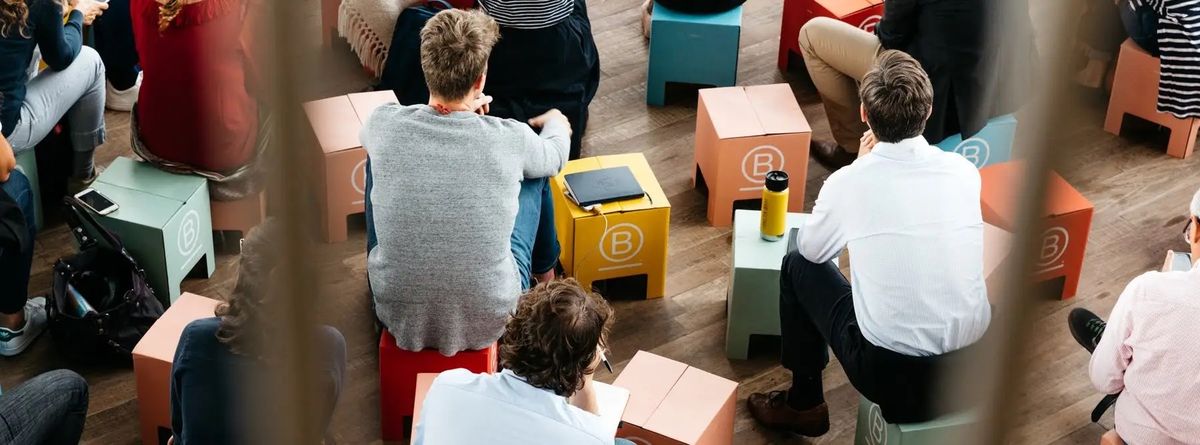It's pretty easy to find ways to do good through your business, by simply connecting with a local charity or adopting best practices like a recycling program. But many business owners want to do more. They want to find ways to scale their social impact and drive social innovation. One of the best ways to do that is to join an innovation network, like B Lab.
B Lab brings together businesses that share common values, to transform the global economy to benefit all people, communities, and the planet. When a business is certified by B Lab, it becomes a B Corps (or benefit corporation), joining thousands of like-minded businesses worldwide.
Sharing knowledge through stories
However, B Lab doesn't just certify businesses. It also creates opportunities for its members to connect and share experiences, to innovate together to tackle issues that are important to them. And it does that through networking events and publishing services, like B The Change, led by Jennifer Kongs, co-founder of Bark Media.
Jennifer: B The Change is the storytelling platform that is run by B Lab and is a contributorship platform for B Corps. So it's really a community-based platform where companies who are leaning into how to do purpose-driven business can share stories of how that's coming about for them.
Through this work, members can discover innovative practices by other members that are good for people and the planet, and scale them by adopting them in their own businesses.
How scale works
For example, Rhino Foods, which makes chocolate chip cookie dough for ice cream manufacturers like Ben and Jerry's, discovered that, like most American working adults, many of its employees couldn't cover small emergency expenses. This kind of thing often prevented them from coming to work or forced them to use predatory payday loan operators, which hurt their financial, social and emotional well-being. So Rhino Foods set up its own loan system.
Jennifer: They worked with the United Way to create what they call an income advance program that enabled employees to pay the loan back by taking a small amount off of their paycheques. Then that could turn into savings after they were done paying back the loan to the company. And this allowed some employees to be able to not only get through a hard time financially, but also set themselves up for future financial success. And I remember hearing stories of employees who went from not having enough money to repair a flat tire on their car to get into work, to putting a down payment on their first home through this program.
Rhino Foods also produced a couple of short videos, in which employees who had benefitted from the new program shared the stories of how it had changed their lives. When others B Corps companies heard the stories, they wanted to do the same thing. That led to B Lab helping Rhino create a curriculum about how to replicate this kind of program in your own community.
By sharing their stories, B Corps are essentially sowing the seeds of innovation.
Jennifer: A lot of times, businesses don't think that they really have a cool story to tell – they don't want to brag about themselves. We really encourage companies to be fearless and experimental with the way they talk about what they're doing. Because, if you think back to the Rhino Foods story, it was actually the examples of the individuals whose lives were changed by the policy that made it so moving. It wasn't just a policy description because that can be fairly dry and specific. But when you see the way an individual's life was changed, then other people, whether they're in HR or at a United Way can be inspired by that and be like, 'Hey, why don't we do something like that here?' Anybody then is emboldened to become a change-maker because they've heard the impact.
Inspiring collective action
But, as B Lab's former marketing director Veena Harbaugh tells us, many companies who want to do more struggle to figure out how to take their impact to the next level.
Veena: What I'm starting to see now is B Corps really reconciling with, what is the collective purpose of our community and what impact can we have beyond improving the practices of our individual businesses or shifting our business models? What can we do together on climate justice? What could we do together on creating racial equity? And so I'm seeing a new layer of purpose in B Corps working collectively together.
How do they do that? It often starts with facilitated conversations about common interests.
Jennifer: So we set up interviews between a B Corps that's been in the community for a long time and a newer B Corps on topics like employee engagement or carbon neutral efforts. And those folks often meet up again and again, to keep sharing with each other and to report back to their own businesses. So that's kind of a hyper-localized version of an innovation network.
Building on this grassroots work, B Corps also helps members organize in more formal ways to take collective action on challenges that matter to them, including climate, income disparity, white supremacy and gender inequality.
Jennifer: For example, there's a large group of B Corps now around the world committing to having net zero carbon emissions by 2030. But how do I do that? I can make the commitment, I can review my carbon and make a plan as a company. But I don't actually have an idea of what that looks like. How long does it take a typical business? Does it cost a lot of money? How many different resources should I be reviewing? How do I talk to people about doing this? Who do I even go to, to ask about this? Those to me are all opportunities for stories to illuminate the process and to give people something to stand on in terms of that end goal. Hearing a story so powerful that I want to replicate that or I want to achieve it. And I want to bring that to my community, my business, my life.
We need tools and space to nurture collaboration
In addition to connecting B Corps through Collective Action Platforms, B Lab supports them with marketing resources. Plus they run an internal social platform called the B Hive where members can support each other.
These kinds of network supports aren't just great for connecting B Corps that may feel isolated in their industry or region. There's also something about the power of intention in joining a network like this that harnesses energy to amplify the impact of your individual business.
Veena: When they decide that they want to be a B Corps, they're entering into that big grand story of 'what does it mean to be a good business?' And so there's a threshold moment where immediately they are tuned into the narrative of what business could be. And how they want their business to be in some relation to that. When they certify, they're saying, 'I believe in a different way of doing business – one that creates positive impact for all stakeholders.' That's our community, our workers, the environment.
Drawing strength from each other
The benefits of operating as part of an innovation network go beyond just sharing information. It can be hugely inspiring.
Veena: We are deeply committed to creating that community and just really inspiring each other because it is hard and we're continually learning all these new layers of ways that business really needs to evolve. We're working a lot on racial equity now and it's challenging. So to be in close community, sharing our stories together helps. And then really exploring, you know, what is the future? What do we want people to look at and view as the culture of business? So B Corps, I think inherently have some commitment to that and they are really generous with each other, sharing their stories because they know that they need that themselves to fuel their work.
By working together and sharing stories of their journey, they're also creating a culture of continuous improvement or innovation that enables them to support each other as they continue to try new things and learn from their mistakes. It's easier to take those kinds of risks when you know you're not alone.
The power of the humble brag
Still, sharing experiences can be a challenge for small organizations, which is the majority of B Corps. They don't have dedicated resources or people to tell their stories. They don't want to be seen as bragging. And they can be nervous about sharing ideas that aren't yet perfect.
But as Jennifer reminds us, when we're committed to our mission and purpose, we have more to lose by not sharing our stories with our network.
Jennifer: I think if Rhino Foods had said, 'I don't want to talk about income advance because I don't want to brag about it to other people', that to me is withholding potential innovation within other people. You're not open sourcing the fact that you have this cool idea that is also very powerful and very impactful. And so you're really limiting the ripples of impact by not humble bragging a little bit.
While becoming a B Corps might not be right for every business, joining a network with real support like this to accelerate innovation can open doors to new opportunities we can't even imagine.
Listen to my full conversation with Jennifer and Veena, and find out more about B Lab and Bark Media.





